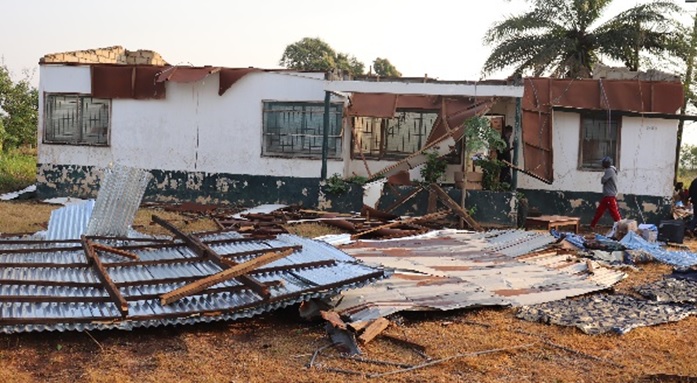By CARI Staff Writer
SUAKOKO, LIBERIA – In a rare meteorological event, a January thunderstorm wreaked havoc on the Central Agricultural Research Institute (CARI) in Suakoko, Liberia. The fierce storm, with powerful winds blowing from the northeast, struck on the evening of Friday, January 24, 2025, causing extensive damage to both residential and research facilities.
The thunderstorm, a stark reminder of the growing impact of climate change on the region, left a path of destruction in its wake. Ten research facilities were severely affected, including greenhouses, warehouses, seed nurseries, seed laboratories, and the Research Building housing the soil laboratory. Additionally, offices, a food processing center, and a dozen homes were badly damaged, leaving research scientists in shock and scrambling for safety.
Since the partial rehabilitation of these facilities in 2015 and 2018 under the SAPEC Project’s arrangement, this is the most significant damage they have faced. The raging winds ripped off roofs, leaving the structures damaged, exposed and vulnerable. SAPEC is the Smallholder Agricultural Productivity Enhancement and Commercialization Project.
Dr. Arthur Bob Karnuah, Director General of CARI, expressed concern over the extensive damage, stating that the storm badly affected more than a dozen homes and research facilities. He emphasized the urgent need for support to repair and restore the vital research infrastructure. “A sizable number of our researchers are currently displaced so we have to urgently accommodate them at other facilities, and offices,” according to Dr. Karnuah.
The Director General used the occasion to appeal to the Government of Liberia, the National Disaster Management Commission, donors, and international partners to swiftly intervene to make rehabilitation possible for researchers to go back to their assigned homes and continue to work.
Dr. Karnauh reemphasized: “As the institution comes to terms with the storm’s aftermath, our focus now shifts to rebuilding and fortifying CARI’s facilities to withstand future climate shocks.
A premier Agricultural Research Institute in Liberia, CARI is dedicated to enhancing agricultural productivity and sustainability through innovative, adaptive, and applied research. CARI’s role is crucial in addressing food security challenges and improving farmers’ livelihoods in the country. Established by the CARI Act of 2016, the institution’s mandate is to undertake comprehensive agricultural research in Liberia. Its broad research scope covers all aspects of food crops, trees, industrial crops, livestock, fisheries, and the farm environment.







